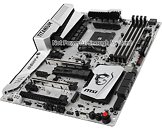Monday, April 15th 2019

MSI Betrays AMD's Socket AM4 Longevity Promise: No Zen2 for 300-series?
Greedy motherboard vendors such as MSI want you to buy a new motherboard every two generations of processor for no sound reason at all. MSI is reportedly blocking support for 3rd generation Ryzen "Matisse" processors on its AMD 300-series chipset motherboards, including those based on high-end AMD X370 and OC-capable B350 chipsets. This would also put those who own $300 motherboards such as the X370 XPower out of luck. To recap, AMD announced on numerous occasions that it doesn't want to be a greedy clique like its competitor, by forcing motherboard upgrades and promised that socket AM4 motherboards will be backwards and forwards compatible with at least four generations of Ryzen processors, running all the way up to 2020.
This normally should mean that any 300-series motherboard must support 4th generation Ryzen processors with a simple BIOS update. Most 300-series motherboards, including from MSI, even ship with USB BIOS Flashback feature to help with forwards compatibility. Unfortunately, motherboard companies such as MSI care more about their bottom-lines than the consumer. In a support e-mail to an X370 XPower Titanium owner, MSI confirmed that it will not extend Zen 2 support to AMD 300-series. Other motherboard vendors could follow MSI's suit as a representative of another motherboard vendor, on condition of anonymity, told TechPowerUp that "Zen 2" processors have steeper electrical requirements that 300-series motherboards don't meet. This is an excuse similar to the one Intel gave for the planned obsolescence of its 100-series and 200-series chipsets, even as it was repeatedly proven that those motherboards can run and overclock 9th generation processors with custom firmware just fine. Would MSI care to explain whether a B450M PRO-M2 has a stronger VRM than an X370 XPower Titanium to warrant "Zen 2" support? Will all "Zen 2" processor SKUs have steep electrical requirements? Will there not be any SKUs with double-digit-Watt TDP ratings?Update (16/04): MSI posted a clarification on this issue.
Source:
master3553 (Reddit)
This normally should mean that any 300-series motherboard must support 4th generation Ryzen processors with a simple BIOS update. Most 300-series motherboards, including from MSI, even ship with USB BIOS Flashback feature to help with forwards compatibility. Unfortunately, motherboard companies such as MSI care more about their bottom-lines than the consumer. In a support e-mail to an X370 XPower Titanium owner, MSI confirmed that it will not extend Zen 2 support to AMD 300-series. Other motherboard vendors could follow MSI's suit as a representative of another motherboard vendor, on condition of anonymity, told TechPowerUp that "Zen 2" processors have steeper electrical requirements that 300-series motherboards don't meet. This is an excuse similar to the one Intel gave for the planned obsolescence of its 100-series and 200-series chipsets, even as it was repeatedly proven that those motherboards can run and overclock 9th generation processors with custom firmware just fine. Would MSI care to explain whether a B450M PRO-M2 has a stronger VRM than an X370 XPower Titanium to warrant "Zen 2" support? Will all "Zen 2" processor SKUs have steep electrical requirements? Will there not be any SKUs with double-digit-Watt TDP ratings?Update (16/04): MSI posted a clarification on this issue.


335 Comments on MSI Betrays AMD's Socket AM4 Longevity Promise: No Zen2 for 300-series?
The point was it is not exactly fair to compare this directly to amount of chipsets Intel produced during the same time in order to support CPUs that had comparatively more changes in them.
If it turns out AM4 covers just 3 generations (and 3rd one just partly), then it won't be much better than what Intel has been doing lately.
It's a bit like when Ryzen came out and AMD fanboys shouted: +50% in one generation! Intel does +5%!
:-D
In recent years Intel made architectural choices that let them utilize high clocks (and constantly improve them).
AMD, when going from FX to Ryzen, focused on IPC, but sacrificed clocks.
2 different approaches, same aim: more performance.
And what do you think about AVX-512? Does it tick your need for IPC improvement?
Currently AMD is in the phase of increasing clocks and core count (Zen 2). Intel is working on a new architecture (Ice Lake).
This makes me wonder:
If Ice Lake gives us big IPC increase, will you praise shift to praising Intel? :-)
But new architecture is a big investment. You have to keep selling it for years to make the whole venture profitable. Potential for improvement in that period is very limited.
Next big architectural leap for Intel will come with Ice Lake (or whatever it's called). It will be a totally new product much like Ryzen has been: both architecture on node (at least it should be...). The improvement could be enormous.You see. So you're not really after performance or IPC. You simply don't like the way Intel does their business. You're ready to buy a potentially worse product from a competition that you find more "morally acceptable". :-)
To be honest, I have nothing against it. You're right.
I buy the slightly more expensive chicken because I've been to a low-cost farm and thinking about it makes me want to vomit. But it's a totally irrational choice economically speaking. I have no proof that the meat is healthier or tastier. I even don't know if that kind of farming is bad for birds. Maybe chickens like to be herded in small space, covered in shit? No one ever asked them.
It's just nice when people admit what their true reasons are. No excuses about IPC and dwarves. :-)
www.msi.com/news/detail/4c78f7b58f4de12ed2cab9bcb9ec0ba0
Where are Ryzen 3000-series (Zen2) expected to launch anyway? Q3?
They are also confirming as many have postulated that the new roms that have recently arrived are for the Zen+ 3000 series APU's not Zen 2.
I would expect mixed compatibility for higher tdp chips and perhaps not all boards getting top slot pcie 4 certification.
Time will tell what turns out to be true... Hopefully in the next 3mo.
It is in the best interest of the board manufacturers to give a reason to upgrade and a reason to stay brand loyal...
Especially for a company like MSI, specializing in gaming products and selling countless different things (both electronics and gadgets/apparel), it makes a lot of sense to cater towards people that spend a lot.
But being a top last-gen chipset, there's a good chance it'll support Ryzen 3000-series as well.
I mean: if it doesn't, then it would likely mean nothing does and you have to buy a chipset launched for Zen2...
But what you say, I actually agree. Was talking to a friend about it, and you might see problems with the 12/24 and or 18/36 cores versions on some cheaper mobos. But many of those 350's do support 95W and over TDP and most of people overclocking are around 120W TDP give or take. In theory this might make the boards able to support these new CPU, but at the same time... the overclocking capabilities should be put to the test.... and of course, any new features will not be added thru a BIOS update.
Cheers.
AMD is expected to launch at least 12-core CPUs. Many hope for 16-core.
There is no way 7nm is twice as efficient as 14nm. These CPUs will use more power.
I think most people hope that they'll be able to upgrade to more cores - not the same number of them, just using 20% less power.For such an AMD fan, you're quite badly informed.
Currently available BIOS upgrades are for 3000-series APUs, which will be based on Zen+. So basically, it's the same tech these motherboards support already - they just need additional data to detect them.
3000-series APUs will likely be launched in May.
Ryzen 3000-series based on Zen 2 (chiplets, 7nm) is coming later and compatibility with existing motherboards is being investigated by MSI (and surely by other manufacturers as well). Whatever that means. Maybe AMD simply didn't allow them to go public yet.
If older motherboards (chipsets) simply can't work with chiplets, then it's a sad but fairly controllable case - people will have to replace them.
If it's an issue with power supply or something like that, MSI will have to cover the more power hungry 12/16-core CPUs somehow (lock cores, underclock etc).
IIRC AMD showed that at 7nm TSMC - the power consumption will be lower by ~50% & then there's other improvements like IPC, IF & even PCIe 4.0 to account for.